

Story by JUSTIN VELLUCCI and JULIA MARUCA
Photos by MASSOUD HOSSAINI
Tribune-Review
April 2, 2023
For many people in and around East Palestine, Ohio, life changed when a Norfolk Southern train carrying hazardous materials derailed Feb. 3 near the Pennsylvania border.
The controlled burn of toxic chemicals that followed sent a large plume of black smoke into the air that could be seen for miles. It’s unknown how long its impact could be felt.
The Tribune-Review spent several days talking with people in and around East Palestine to see how they have been impacted by the derailment.
Here are some of their stories.
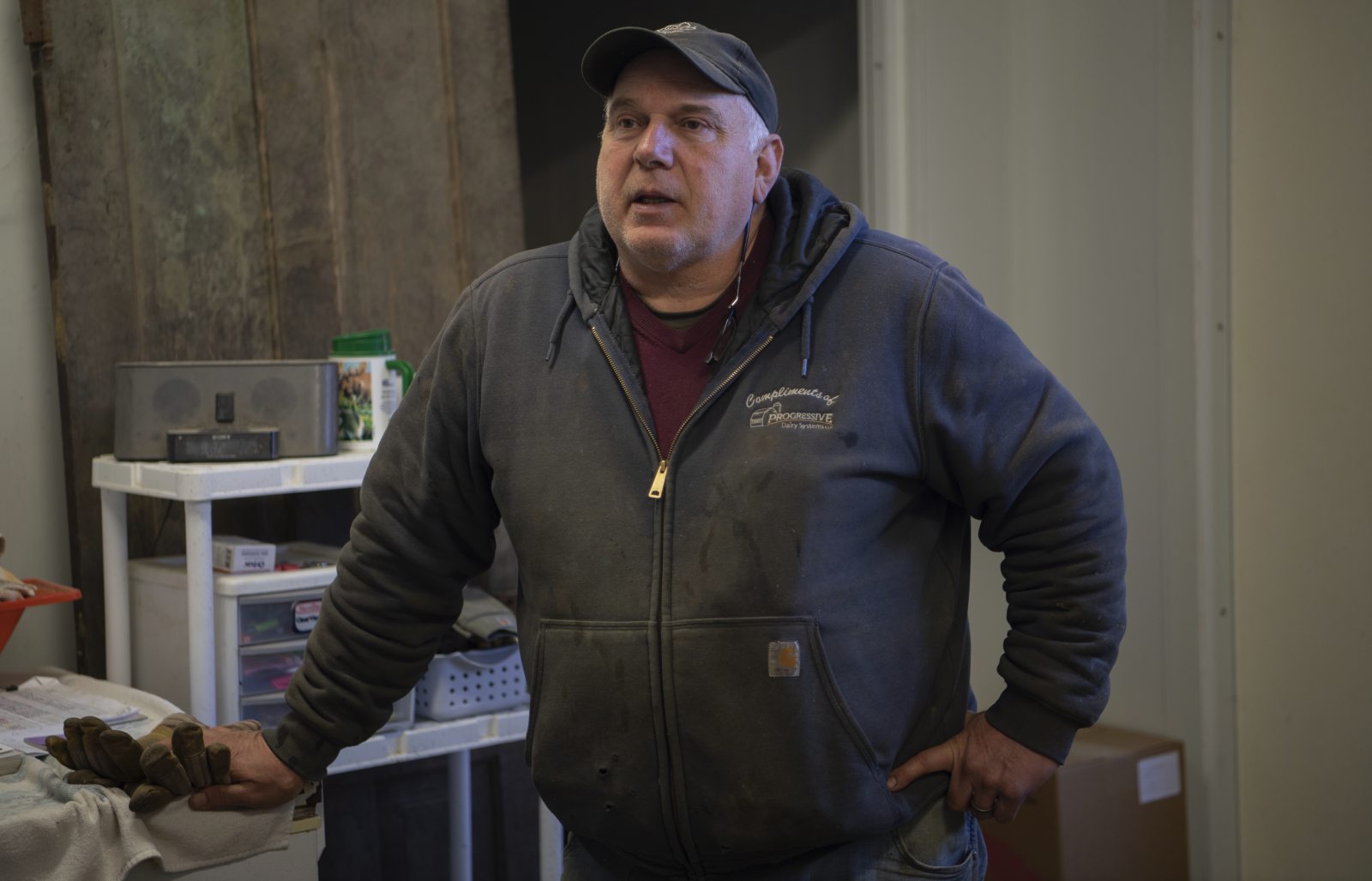
Callers from as far away as Montana, Nebraska and Texas have threatened Scott Lindsay since the train derailment — saying they will “expose him” if he keeps funneling his milk into the national supply chain.
Lindsay’s Pine Hill Jersey Farm, located about four miles from downtown East Palestine, ships 25,000 pounds of milk daily to a cheese plant in central Ohio.

“They ask, ‘Where’s your milk going?’ and say, ‘The public has a right to know,’” Lindsay said as he stood in the backroom of one of his milk production facilities.
Lindsay said the chemicals burned at the derailment site didn’t bring smoke or fumes to his farm, where milk production has been stable and seemingly unaffected. The farm’s 800 animals, including 480 milking cows, also have been unaffected, he said. A calf born after the derailment arrived without complications or illnesses.
Lindsay has been the face of Pine Hill Jersey Farm since 1987, when he took over for his father, Charles Lindsay, a World War II Air Force bomber who bought a beef farm in 1949 and transformed it into a thriving milk-production operation.
Lindsay has taken the lead among local farmers in speaking with the news media and government agencies such as the Ohio Department of Agriculture and the state’s farm bureau.
“They wanted to know what our concerns were and how they could address that,” he said. “We’re concerned with losing our brand in Columbiana County and people being afraid to try our products.”
Lindsay said he couldn’t rely on Norfolk Southern or the U.S. Environmental Protection Agency to tell the story in a way that was fair to local residents.
“They’re out-of-town people that the people couldn’t trust anyway,” he said. “We want to be the face of this.”

As people living near the derailment site began evacuating the area, Craig and Kelly Glass hunkered down and prepared to take in as many animals as they could at their 30-pet kennel, Darlington Paws.
The kennel, six miles from the derailment site in Beaver County’s Darlington Township, received more than 50 requests from people looking to kennel their pets. The Glasses offered space to families from East Palestine free of charge.
“We got slammed,” said Craig Glass, who co-owns the kennel with his wife. “We couldn’t take everybody.”
The kennel sits on four acres on Wallace Run Road, giving animals that stay there plenty of room to romp around. It has been in operation for nearly 40 years, with the Glasses running it for the past two.
Craig Glass said he watched the black plume of smoke, heavy as a sheet of fog, creep onto the property after the controlled burn from the derailment site began.
“It got very ominous quick — dark, scary — and it lasted for hours,” he said.
The weeks since have been unusually quiet.
“Nobody’s come to check on anybody,” Kelly Glass said. “Nobody’s testing our soil or our well. It just is what it is. You’re in Pennsylvania? Oh well, you’re on your own.”
The Glasses said they feel fortunate they’re not closer to the derailment site.
“It’s sad. It’s really sad. I feel bad for those people (living closer to the derailment site),” Kelly Glass said. “You don’t know the long-term effects (of the chemicals) or how far they’re going. But we’ve been OK down here.”
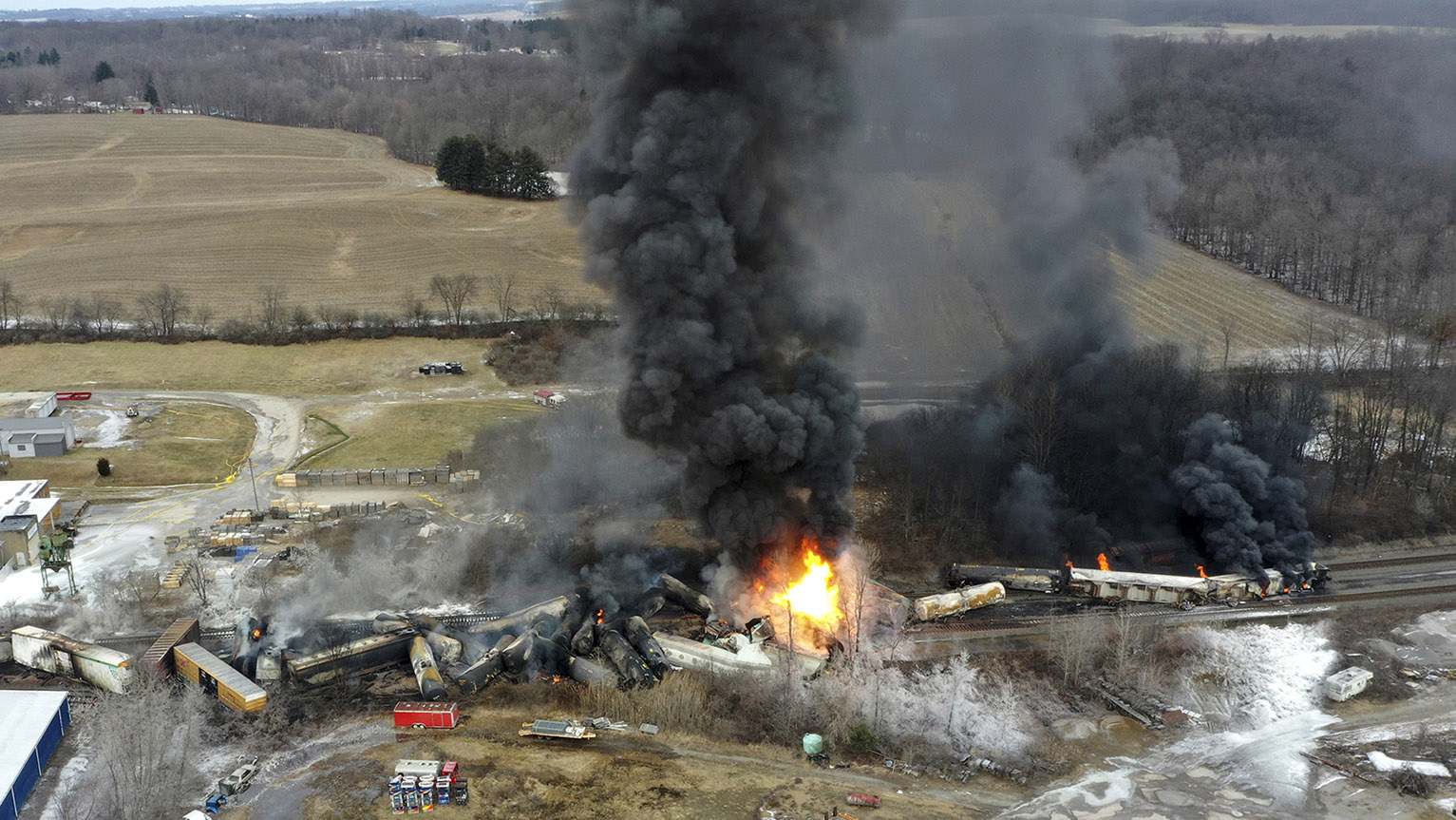
Marty Kerr started hunting at age 11 when his stepfather took him to Columbiana County’s Hellbender Bluff hunting area and other game lands to shoot small game including rabbits, squirrels and turkeys.
Now in his mid-30s, Kerr said he doesn’t know what to do with the game he hunts. He pointed to reports indicating that tens of thousands of fish, most of them small minnows, were killed in waterways close to the derailment site.
“That’s one thing we don’t know — will the deer be safe to eat?” asked Kerr, a lifelong East Palestine resident who has belonged to the East Palestine Sportsmen’s Club for about three years. “(Deer) are drinking this water and everything. Is it safe to feed it to my family?”
Kerr was participating in a shooting competition at the sportsmen’s club on the night of the derailment. An edge of the club’s property sits 500 yards from the train tracks where the derailment occurred.
After hearing the crash, Kerr and others walked outside to see flames engulfing the horizon.
“It looked like the woods were on fire,” Kerr said.
He said a smell that he described as pungent and acidic permeated the air in East Palestine in the early weeks after the derailment.
“It went away for a little bit. But when they dug up those train tracks, it all came back,” Kerr said.
He said he still isn’t using the well water at his house. It’s one less thing for him to worry about.
“I trust our city water right now. The guys who run it, they’re from East Palestine,” he said. “As soon as something goes bad, these guys won’t hide anything. The water’s going to their houses same as mine.”
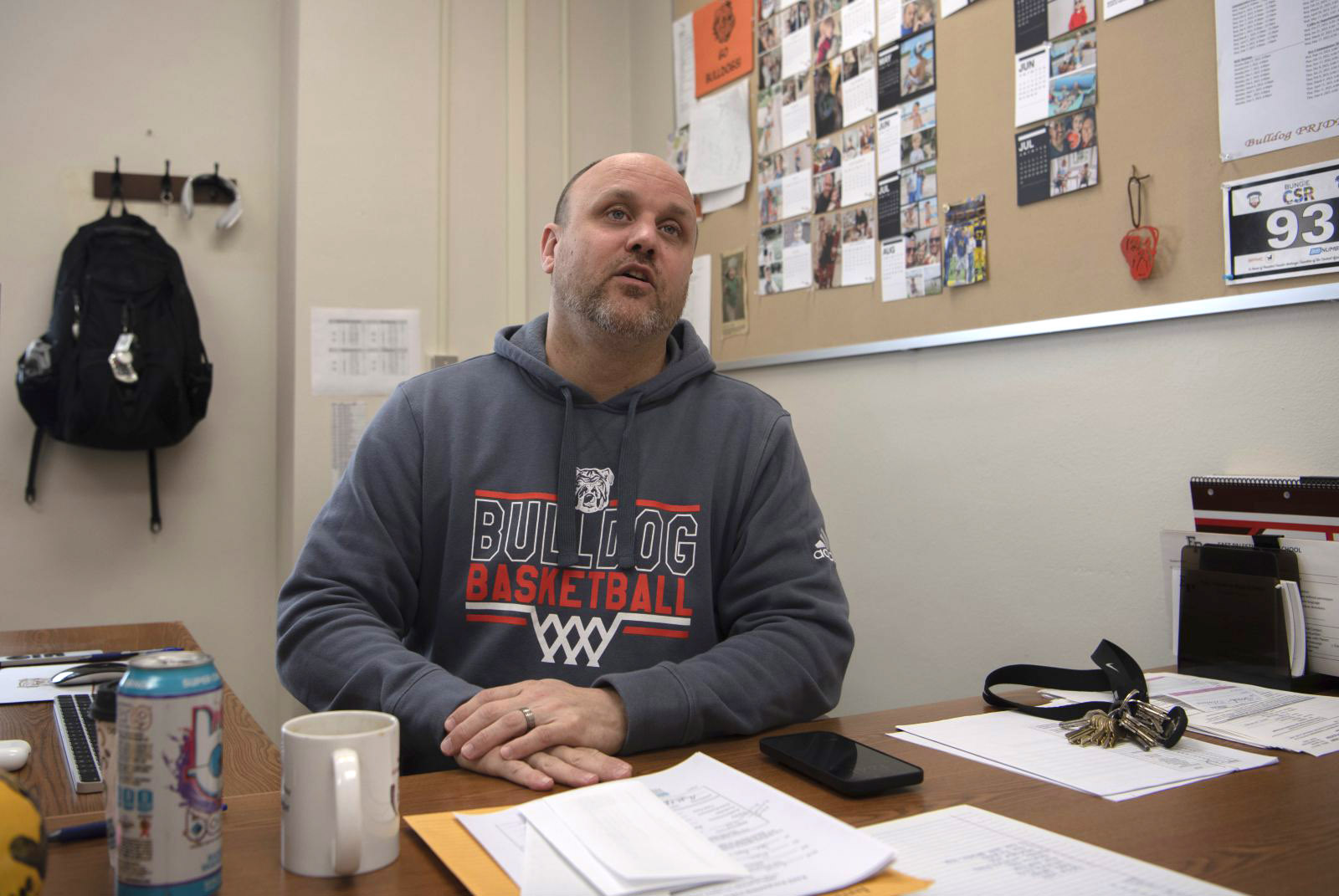
The East Palestine High School girls basketball team won a sectional playoff game less than two weeks after the derailment because its opponent, a school from Trumbull County, refused to travel to East Palestine for the game because of safety concerns.
“They wanted us to move the game,” said Dwayne Pavkovich, East Palestine’s athletic director and assistant high school principal. “Obviously, (our site) is perfectly fine. … Moving a basketball game would’ve put a sense of shock into people.”
The forfeit wasn’t the win East Palestine wanted, but it’s the one the team got.
Pavkovich said he has been impressed by how East Palestine’s students have responded to the derailment.
“They are not running from it. Our student leaders are grabbing the bull by the horns,” Pavkovich said. “These kids are getting a Ph.D. in how to adjust and manage situations. I give them credit.”
As confusion and fear swirled around the community, Pavkovich said students took the initiative to schedule an information session with government agencies for Ohioans with questions about the derailment.
Reporters from EPTV — the school’s weekly, student-run television program — went to a news conference about the derailment and demanded answers to their questions.
Students also started to make a documentary to tell their version of the derailment story.
“Our students have been awesome. They’ve turned this into a positive. They want to be part of the solution,” Pavkovich said.
At the same time, they also want things to get back to normal.
“They want to go back to worrying about prom, those types of things kids want to think about,” Pavkovich said.
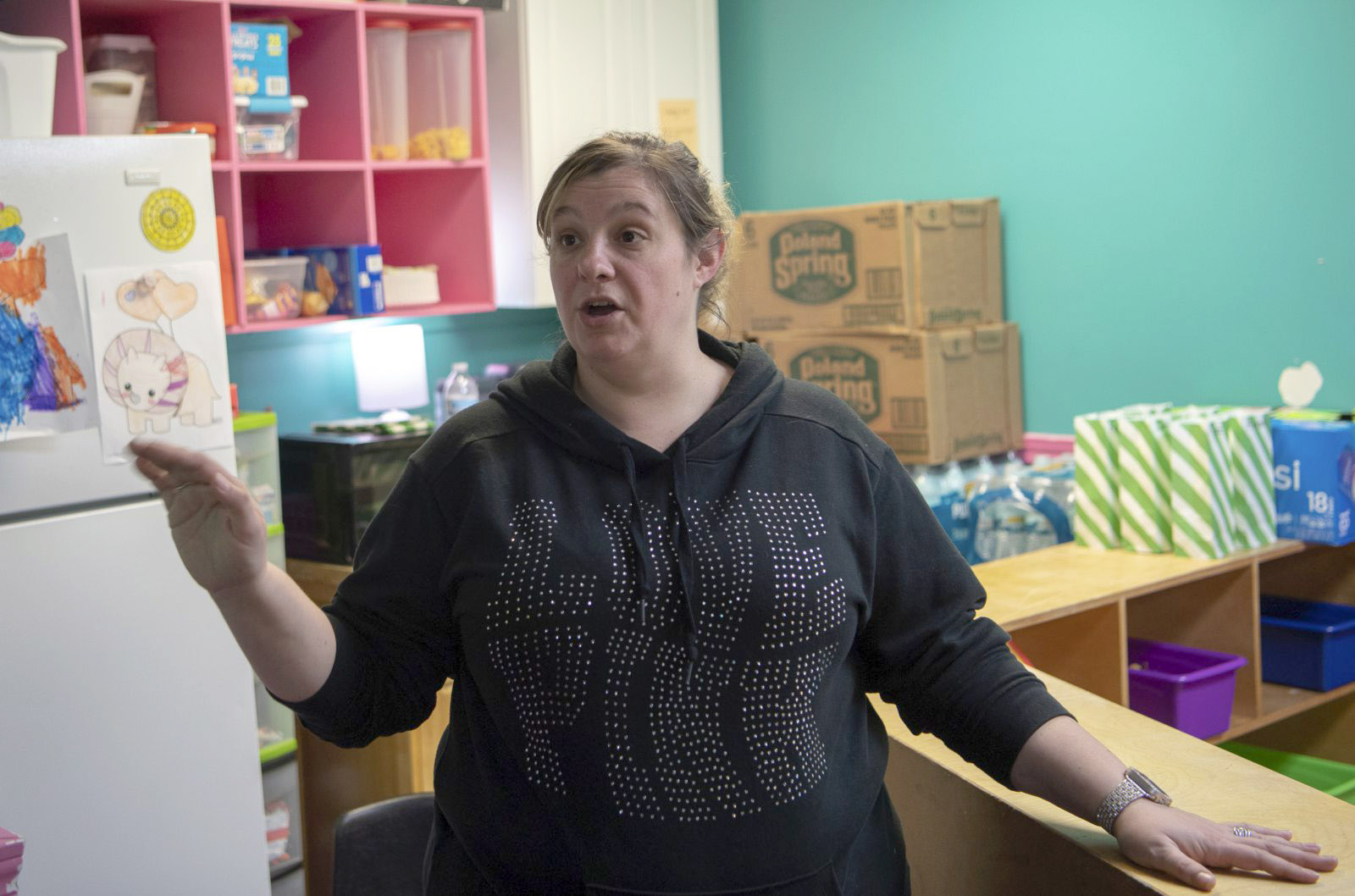
Brittany Dailey has continued to run The Learning Tree Childcare Center in East Palestine, but she has yet to return to her home.
Dailey evacuated her home — less than a mile from the derailment site — around the time the toxic chemicals started to burn. Since, she and her family have lived in a hotel about 30 minutes away in Beaver County’s Center Township. The silver lining: Her 8-year-old son is happy the hotel has a pool.
Dailey said in an interview in mid-March that she wasn’t ready to return home.

She has continued to run The Learning Tree in downtown East Palestine, though — but it hasn’t been easy.
Seven children and two staff members have left since the derailment, citing health or environmental concerns. Dailey doesn’t know how much more she can lose before the business has to close.
“There is no back to normal yet,” Dailey said.
She said she talked to Norfolk Southern about being reimbursed for losses including declined enrollment and possible contamination of $15,000 worth of playground equipment and mulch. She said the rail company wanted to see three years of her tax returns, which she considered overbearing.
Dailey said she cleaned The Learning Tree from top to bottom after the controlled burn. She brought in an environmental contractor from New Brighton in Beaver County to test the air quality, and results showed air in the building was safe. She vacuumed air ducts. She scrubbed carpeting.
“I’m very transparent. The water’s been tested, the air’s been tested, this and that. But (health concerns) are what’s going on in our town, as well,” Dailey said as she sat in an undersized, blue toddler’s chair in a Learning Tree classroom.
Along with reports of rashes and headaches, babies from East Palestine who go to The Learning Tree developed eye infections after the derailment. She said she didn’t believe all of the state and federal agencies that said East Palestine is a safe place to live.
“I feel they’re saying that just because,” Dailey said. “It’s to cover themselves, because that is what they’re being told to say.
“As far as I’m concerned, it’s up to the individual to decide if they want to come into town or not.”
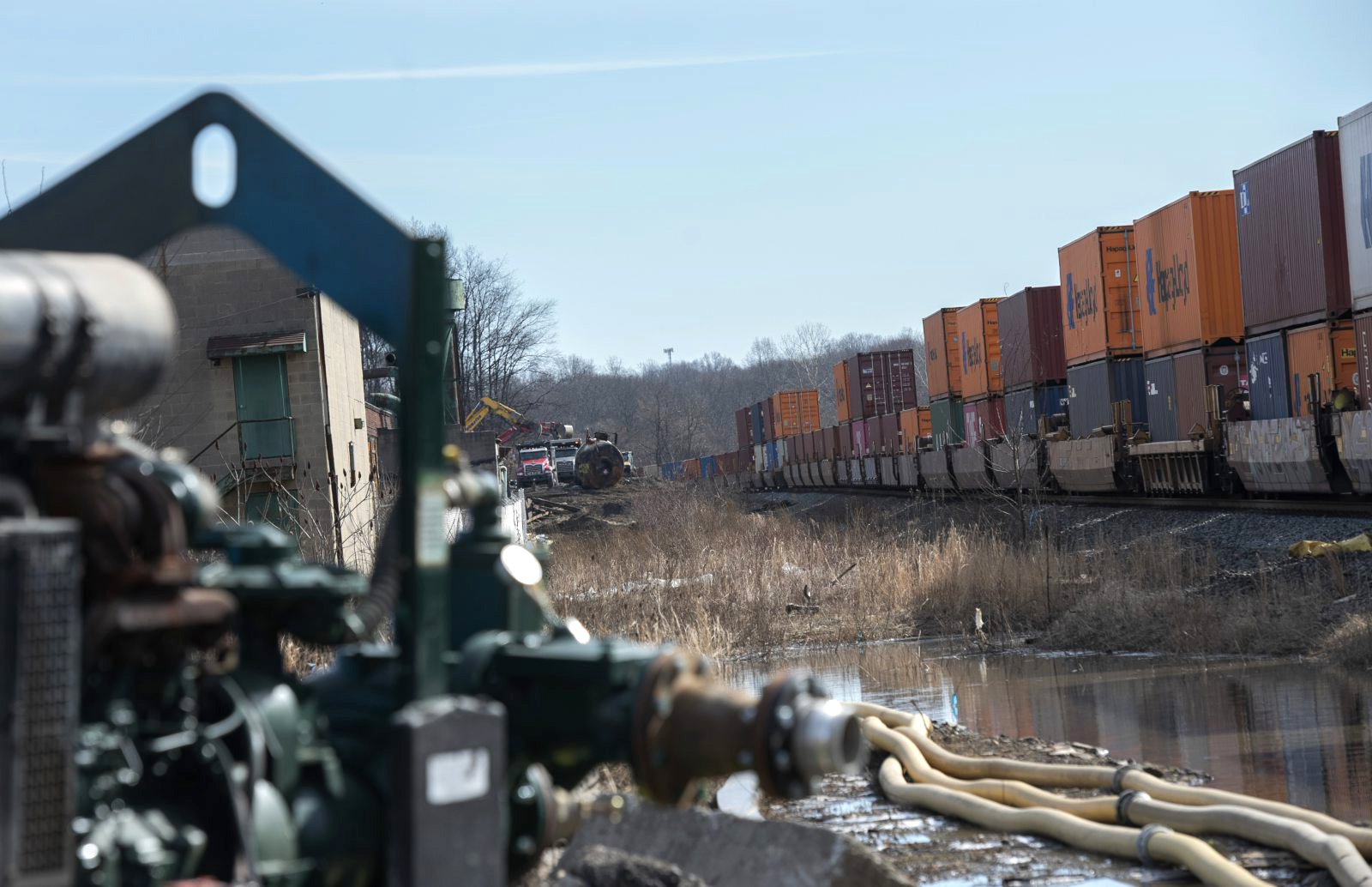
Mark Durno thinks in numbers.
An Environmental Protection Agency response coordinator who typically works as a Homeland Security adviser out of the agency’s Cleveland field office, Durno knows logistics and planning. When he talks about the U.S. government’s response to the East Palestine derailment, he talks about tangible, concrete things: facts, statistics, figures.
The EPA had up to 45 people working in East Palestine, and they were supported by another 35 contractors carrying out tasks such as maintaining the EPA’s network of air monitors in the area, Durno said. Those 80 people worked in overlapping 12-hour shifts.
As of mid-March, Durno had been on the ground in East Palestine for weeks. He stayed with his parents in the nearby Youngstown area when he wasn’t working.
“I’ll be here as long as it takes,” Durno said. “Being a local guy, I’m going to stick around.”
In addition to the EPA’s presence, the Centers for Disease Control and Prevention and its Agency for Toxic Substances and Disease Registry had 17 people dedicated to East Palestine, with five of them on the scene full-time, Durno said.
The Federal Emergency Management Agency and the Ohio EPA both had nine people dedicated to East Palestine, and the U.S. Coast Guard supplemented those numbers with six people, Durno said. FEMA had more than 60 people in East Palestine at its peak.
“It’s a pretty large footprint,” Durno said of the manpower. “For a train derailment, this is atypical. In this case, the numbers grew because of the pressure being put on all levels of government to ensure the safety of the people of East Palestine.”
Durno compares the response to the drinking-water crisis in Flint, Mich., in 2016.
Despite a heavy dose of anti-government sentiment regarding the derailment response, Durno said he thinks the EPA “is doing an exceptional job.”
“We had people out the door, on scene within several hours of this derailment,” he said. “You always overplan when these incidents occur, but our state partners realized right away this was a big one.”
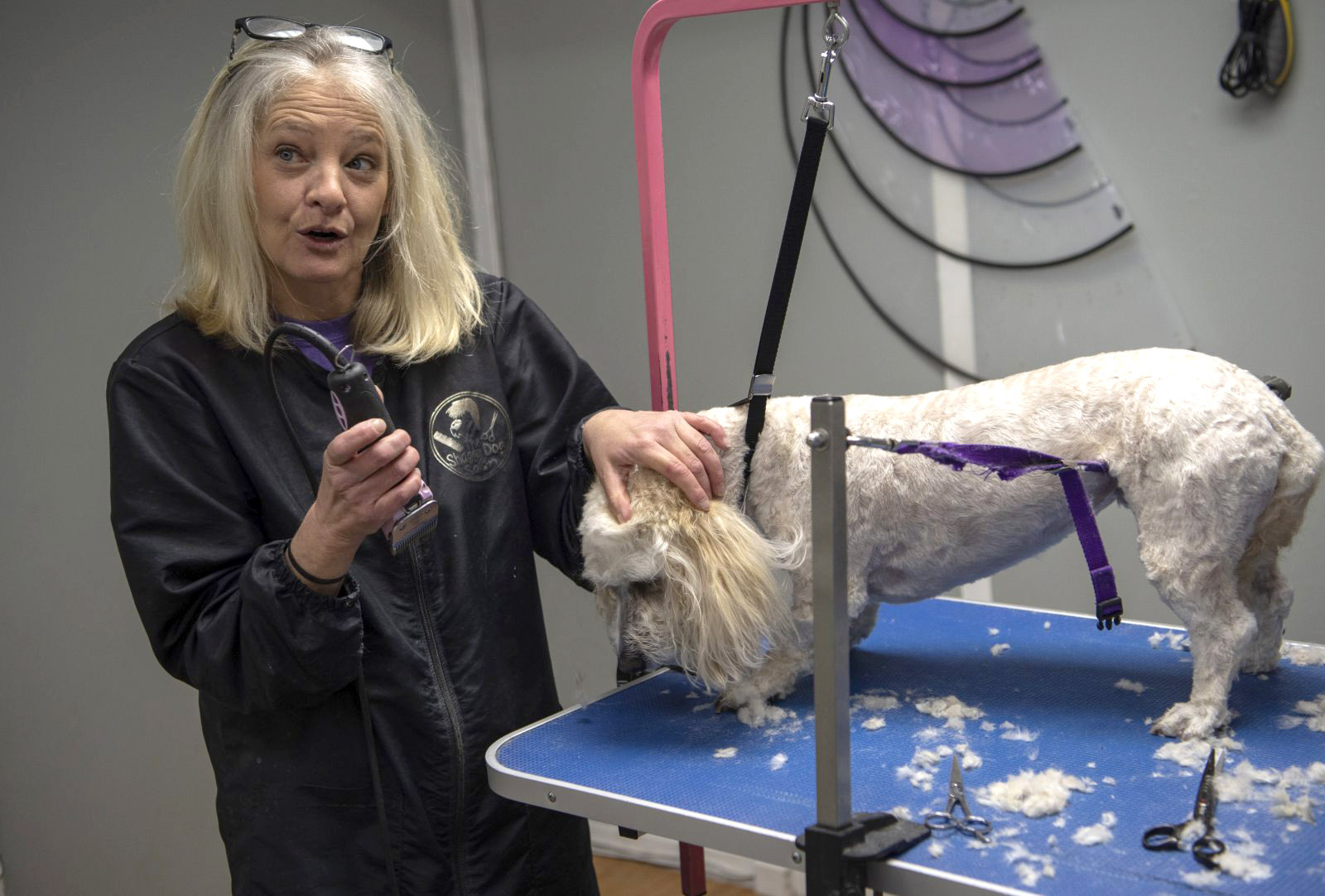
While some East Palestine businesses have yet to bounce back from the derailment, that isn’t the case at Shaggy Dog Salon.
The phone won’t stop ringing.
Lisa Holisky, who has owned the downtown East Palestine business for about three years, is helping out on this day because one of her groomers called in sick. She darts between the ringing phone and cutting rivulets of curly, golden hair from a Dachshund mix named Mr. Barnaby.
The salon, with its high ceilings and dark floors, resembles a hair salon for humans more than a grooming spot for four-legged friends. Holisky wears a wispy black smock emblazoned with the store’s name on it, completing the beauty-parlor picture.
The Shaggy Dog Salon is one of three dog-grooming businesses in East Palestine.
Holisky, an East Palestine High School graduate who has lived in town for 47 years, said there’s a tremendous need for their services.
“We are just trying to get the message out: We are still here. We are still working,” Holisky said.
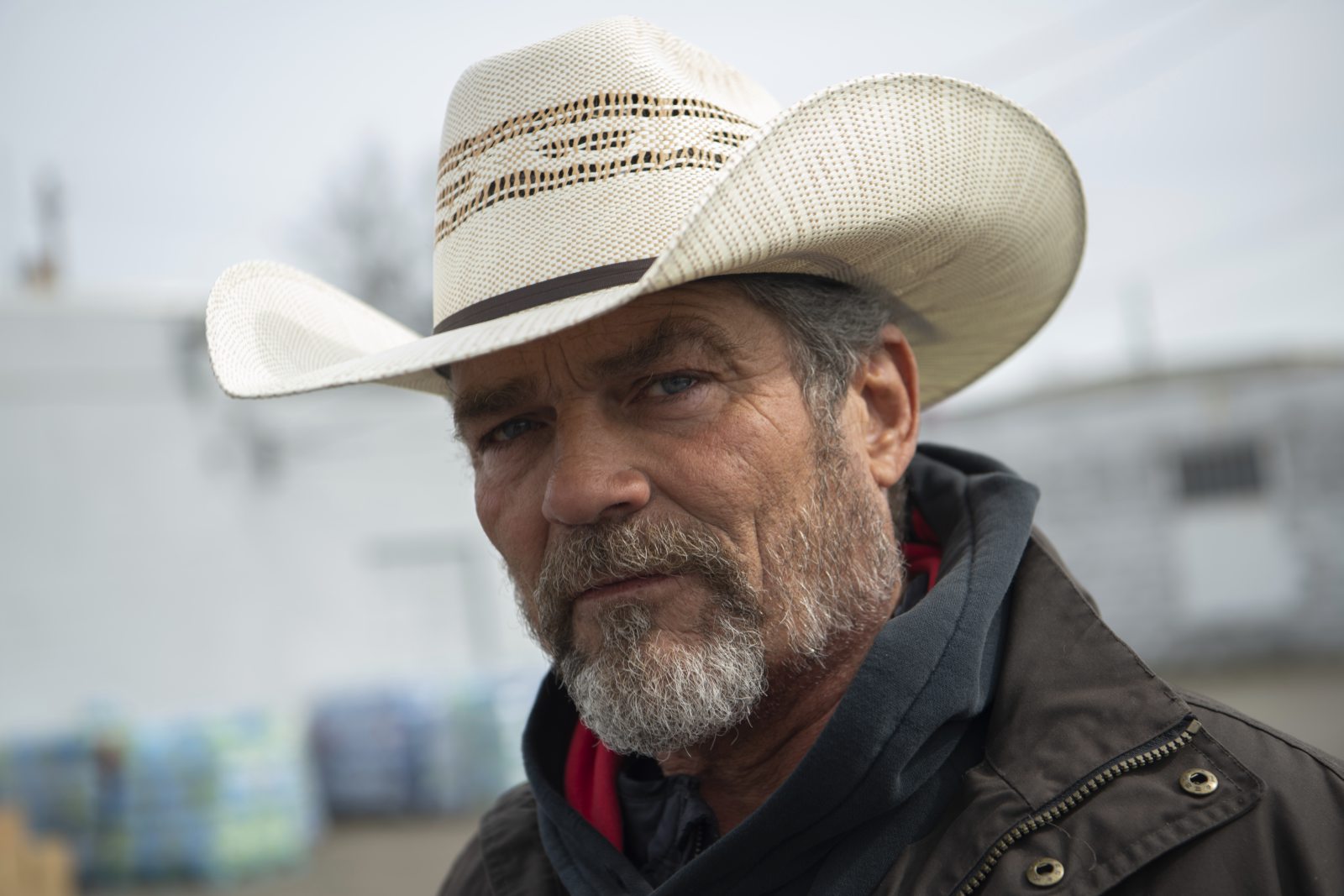
In a car dealership parking lot near where train tracks split East Palestine in two, Dave Graham is doing his best to bring everyone together.
Known by many as Cowboy Dave, Graham waves to passing motorists with his white cowboy hat. A steady stream of cars pulls into the lot to see him.
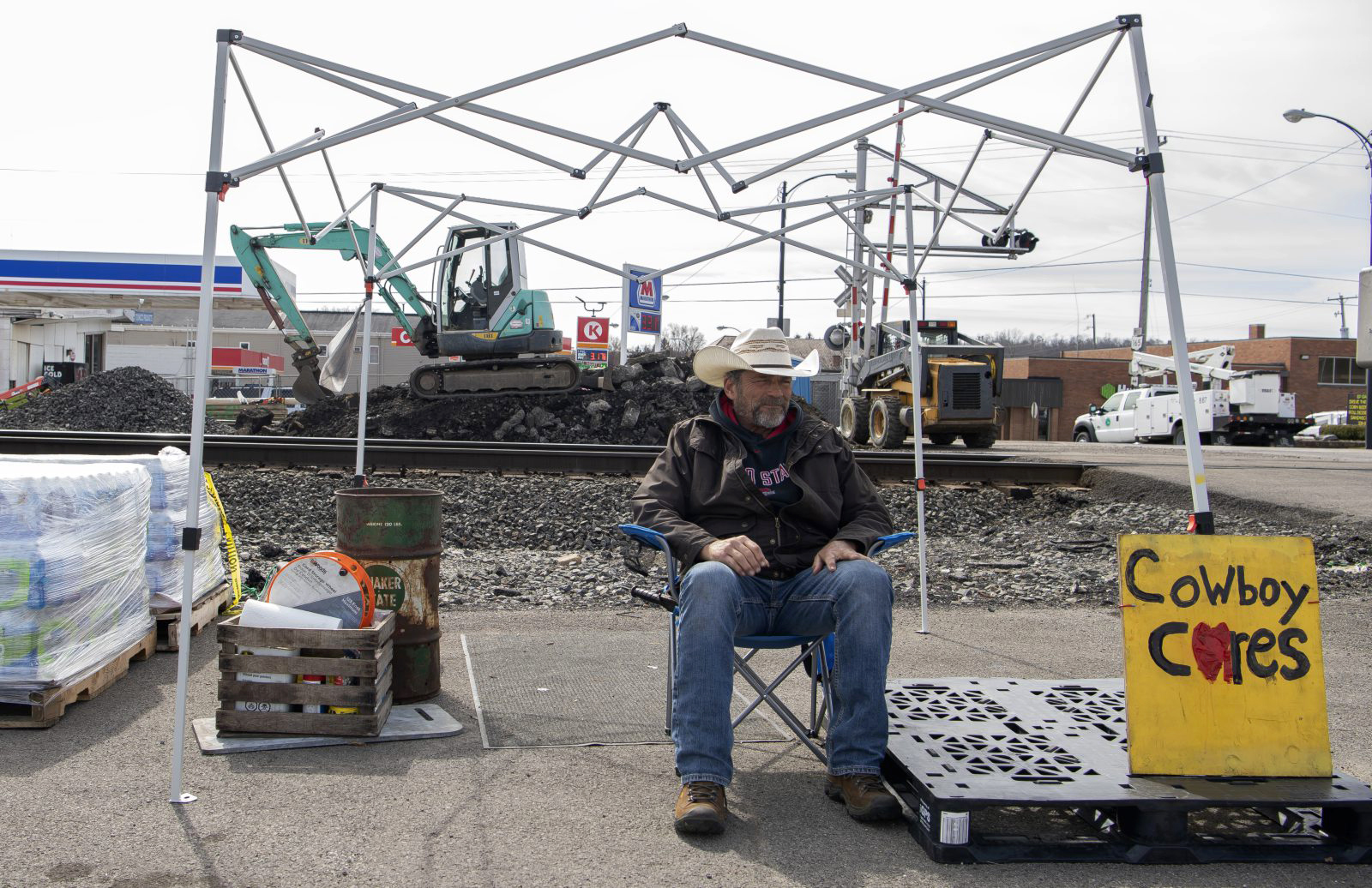
In the weeks following the derailment, the dealership became a site for free bottled water distribution. Graham, who is from Fredericktown in central Ohio, has spent the past 20 years volunteering at disaster sites across the U.S.
He said he planned to stick around East Palestine for the next three or four months.
Each day, Graham, who lives in his pickup, spends the day lifting cases of bottled water into vehicles, waving at people and making conversation. He is surrounded by signs with messages including “East Palestine Strong,” “No BS” and “Cowboy Cares.”
“It’s not about loading water; it’s about letting people know that we realize they are anxious,” Graham said. “We’ve made this as a stop-and-talk. If they want to come here and eat their McDonald’s, if they want to talk to somebody and talk to them about how they feel, we try to make it that spot.”
A pallet can hold 50 cases of water, and the site typically goes through six to 10 pallets a day, Graham said.
“We’re seeing 200 to 300 cars here every day,” he said.
The spot next to the tracks can sometimes be tense. In the aftermath of the derailment, some residents would tense up or roll up their windows whenever a train rumbled past. Others would make rude gestures out their car windows while waiting at the train crossing, he said.
“People are shell-shocked,” he said.
Graham planned to help further by bringing 60 chickens from his farm in Fredericktown to give to locals. He said some people who have chickens aren’t eating their eggs because of safety concerns.
“I’m trying to provide tangible help,” Graham said.

When Ginny Fawcett was young, she said she knew East Palestine as “the town to go to.” She remembers piling into the car with her family to shop there. When she and her husband of 33 years, George Fawcett, retired, they knew they wanted to move back to town.
Their ranch-style house is a tenth of a mile from the derailment site. They were out of the area when the derailment happened but returned home late that night.
“We were driving and I looked to the left and I saw flames. I said, ‘I hope that isn’t our house,’” Ginny said.
“How many fire trucks are there in the world?” George added. “It was like they were all here.”
What followed was a confusing string of trips to and from the house and evacuations. They returned home for good a few days later and have been living in the house since.
There has been no smell at the house, and the city water is safe to drink, Ginny said. The couple had tests done at the home that showed safe readings, she said.
The Fawcetts haven’t experienced any health side effects, other than “our blood pressure is up a little bit,” she said.
“I trust God is going to make sure everything is taken care of, and I trust our government. A lot of people don’t,” Ginny said. “I trust our local government, our mayor and the firemen and all of them, they have been so great. I trust that they’ll get this cleaned up. I just leave it in God’s hands.”
One day a week, the couple can be found helping out at The Way Station. The combination thrift store, food pantry and community resource center is tucked away in the basement of First United Presbyterian Church, where George serves as the church organist.
George and Ginny spend their Thursday mornings picking up bread donations from Panera Bread locations.
“We bring it back here and distribute it to folks less fortunate than we are,” George said.
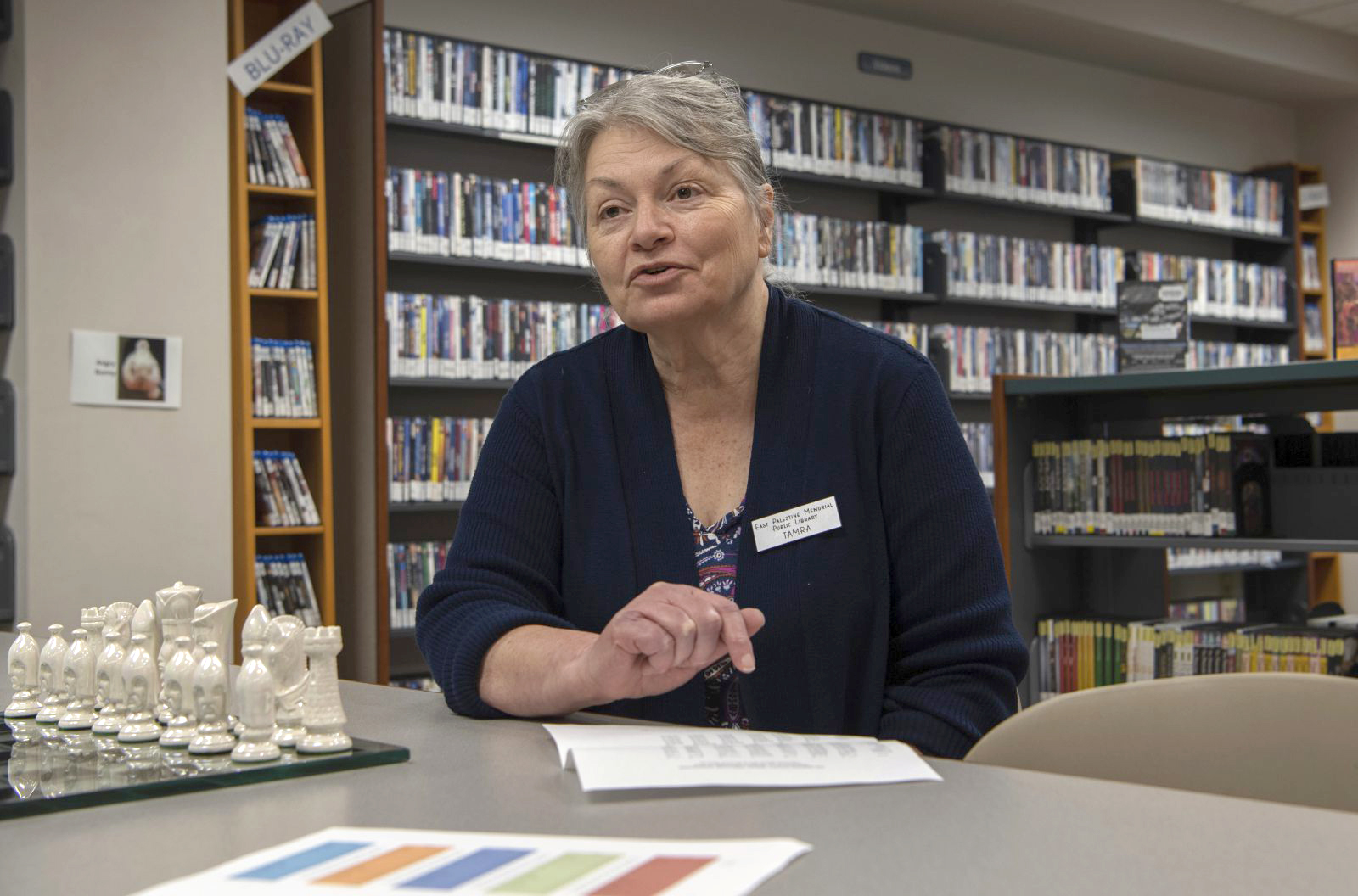
It’s midday on a Thursday, before school lets out, and it’s eerily quiet inside East Palestine Memorial Library. Library director Tamra Hess fears this may be the new normal.
“We’ve been trying to come back from covid, which did a great deal of damage to our circulation,” Hess said. “We were just starting to see an increase, and then (the derailment) happened, and we are right back where we started.”
The library usually sees more than 2,000 visitors a month. In February, it had just over 1,000 visitors, according to Hess. February is a shorter month, and the library had to close for a few days during the derailment.
In January, people checked out 4,765 items from the library. That number dropped to 3,687 in February — the lowest monthly total since April 2021.
Funding for the library could be at stake if circulation and patron numbers don’t keep up. Full-time staff, circulation, building size, the amount of money spent on materials and the number of borrowers all factor into determining how much funding libraries receive from the state of Ohio.
The library is more than just a place for borrowing books. Local businesspeople recently held an informal meeting there to discuss ways to try to get people back in town.
“Some people from out of state still think the fire is burning because all they see (on the news) are the burning tankers,” Hess says. “I don’t know that we’ll get back to normal anytime soon, but we’re trying to let people know that East Palestine is open, that businesses are open, and as far as we know, at this point, the air is safe.”
The library has planned activities for the next three months, including an upcoming “Reading to Rabbits” event with therapy animals for kids and group story times. Hess hopes they are well attended, but she said some parents called after the derailment to let her know that they “wouldn’t be back anytime soon” to attend programs.
“We just want to have this be a space where people can come, check out things to read, and we certainly have digital items that they can check out online,” Hess said as she looked around the near-empty library. “It is peaceful in here. Sometimes the staff, we laugh when we’re talking, but it is a peaceful place.”
Justin Vellucci and Julia Maruca are Tribune-Review staff writers. You can contact Justin by email at jvellucci@triblive.com or via Twitter @JVTheTrib. You can reach Julia at jmaruca@triblive.com or via Twitter @marucajulia.